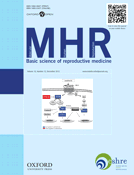
MOLECULAR HUMAN REPRODUCTION
Scope & Guideline
Exploring the Molecular Frontiers of Human Reproduction
Introduction
Aims and Scopes
- Molecular Mechanisms of Reproduction:
Research exploring the molecular and cellular underpinnings of human reproduction, including gametogenesis, fertilization, and early embryonic development. - Infertility and Its Etiology:
Studies investigating the causes of infertility in both males and females, addressing genetic, epigenetic, and environmental factors. - Reproductive Technologies:
Innovative approaches and methodologies in assisted reproductive technologies (ART) including IVF, ICSI, and embryo culture optimization. - Endometrial Biology and Implantation:
Research focusing on the endometrium's role in implantation, including hormonal influences, immune responses, and cellular interactions. - Animal Models of Reproductive Health:
Utilization of animal models to study reproductive processes, disease mechanisms, and potential therapeutic interventions. - Epigenetics in Reproductive Biology:
Investigation of epigenetic modifications and their implications for fertility, embryonic development, and reproductive disorders.
Trending and Emerging
- Single-Cell Analysis Techniques:
The use of single-cell technologies to study oocyte and embryo development is gaining traction, allowing for more detailed insights into cellular heterogeneity and developmental competence. - MicroRNA and Extracellular Vesicles:
Research on the roles of microRNAs and extracellular vesicles in reproductive processes is emerging, particularly their regulatory functions in oocyte and embryo development. - Impact of Maternal Health on Reproductive Outcomes:
Increasing focus on how maternal health conditions, such as obesity and metabolic disorders, affect reproductive outcomes and embryonic development. - Genetic and Epigenetic Factors in Infertility:
Studies investigating the genetic and epigenetic underpinnings of infertility, including the role of specific genetic variants and epigenetic modifications. - Innovations in ART and Embryo Culture:
Emerging methodologies in ART, including improved culture conditions and embryo selection techniques, show a trend towards enhancing success rates in assisted reproduction. - Cross-Species Comparisons in Reproductive Research:
An increasing interest in comparative studies across species to understand reproductive mechanisms and their evolutionary implications.
Declining or Waning
- Traditional Fertility Treatments:
Research related to conventional fertility treatments such as Clomid and standard IVF protocols seems to be declining, as newer methodologies and technologies gain prominence. - Basic Physiology of Reproductive Organs:
Studies focusing solely on the basic physiological functions of reproductive organs without molecular or genetic context appear to be less common. - Generalized Population Studies:
Broad epidemiological studies on reproduction without a specific molecular or mechanistic focus are becoming less prevalent in favor of more targeted, mechanistic investigations. - Hormonal Treatments Without Molecular Insights:
Research on hormonal treatments that lacks molecular analysis or understanding of underlying mechanisms is less frequently featured, reflecting a shift towards more integrated approaches. - Invasive Procedures in Fertility Treatments:
Interest in invasive procedures for fertility treatments, such as surgical interventions, seems to be diminishing in favor of non-invasive or less invasive techniques supported by molecular findings.
Similar Journals
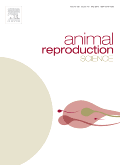
ANIMAL REPRODUCTION SCIENCE
Connecting Research and Practice in Animal ScienceANIMAL REPRODUCTION SCIENCE, published by Elsevier, is a leading journal dedicated to the field of animal reproduction and developmental biology. With an ISSN of 0378-4320 and an E-ISSN of 1873-2232, it serves as a vital resource for researchers, professionals, and students interested in advancing their understanding of reproductive mechanisms across various species. The journal has been recognized for its high-quality contributions, achieving a Q1 ranking in Animal Science and Zoology and showcasing its significant impact in the areas of Endocrinology and Veterinary Medicine as per the 2023 category quartiles. Covering a wide range of topics from reproductive physiology to genetic implications, this journal not only highlights innovative research but also fosters interdisciplinary dialogue in the rapidly evolving world of animal science. Though not currently offering open access, it remains a crucial platform for disseminating pivotal research findings from across the globe. With its rich history dating back to 1936, ANIMAL REPRODUCTION SCIENCE continues to drive excellence in animal reproduction studies, positioning itself at the forefront of the field, and solidifying its relevance in both science and industry.

International Journal of Fertility & Sterility
Championing Excellence in Reproductive ResearchThe International Journal of Fertility & Sterility, published by ROYAN Institute, is a leading academic platform dedicated to advancing knowledge in the fields of obstetrics, gynecology, and reproductive medicine. With an ISSN of 2008-076X and an E-ISSN of 2008-0778, this Open Access journal has been making significant contributions to the scientific community since its inception in 2007. Based in Tehran, Iran, the journal showcases rigorous research and promotes interdisciplinary collaboration, addressing critical topics related to fertility, sterility, and reproductive health. As of 2023, it holds an impressive Q2 ranking in Obstetrics and Gynecology and a Q3 ranking in Reproductive Medicine, underscoring its relevance and impact in the academic sphere, with Scopus ranks placing it at #67 in Obstetrics and Gynecology and #32 in Reproductive Medicine. The journal's commitment to accessibility and quality is reflected in its global readership, making it an essential resource for researchers, healthcare professionals, and students seeking to enhance their understanding of fertility issues and reproductive technologies.
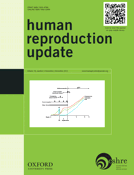
HUMAN REPRODUCTION UPDATE
Exploring Innovations in Obstetrics and GynecologyHUMAN REPRODUCTION UPDATE, published by Oxford University Press, stands as a leading journal in the fields of Obstetrics and Gynecology and Reproductive Medicine. With an impressive Q1 ranking in both categories according to the 2023 category quartiles and a significant Scopus rank, it is recognized as one of the top journals globally in these disciplines, catering to the most relevant and cutting-edge research. The journal has been a crucial platform for disseminating vital findings and reviews from 1995 to 2024, contributing to advancements in human reproductive health. With its focus on publishing high-quality, peer-reviewed articles, it serves as an essential resource for researchers, healthcare professionals, and students seeking the latest insights and developments in reproductive science. As the journal aims to foster informed discussions and encourage further research, it remains committed to shaping the future of reproductive health and medicine.

JOURNAL OF ASSISTED REPRODUCTION AND GENETICS
Transforming Knowledge in Genetics and DevelopmentThe Journal of Assisted Reproduction and Genetics, published by Springer/Plenum Publishers, serves as a pivotal platform for innovative research and advancements in the fields of reproductive medicine, genetics, and developmental biology. With an impact factor that positions it within the upper echelon of its categories—including Q1 rankings in Obstetrics and Gynecology and Reproductive Medicine—this journal plays a critical role in disseminating high-quality, peer-reviewed studies that significantly influence clinical practices and research directions. Renowned for its commitment to enhancing understanding in areas such as assisted reproductive technologies, genetic screening, and reproductive health, the journal attracts contributions from leading experts worldwide. With a broad scope encompassing original research, case studies, and comprehensive reviews, the Journal of Assisted Reproduction and Genetics continues to be an essential resource for researchers, healthcare professionals, and students dedicated to the advancement of reproductive sciences.
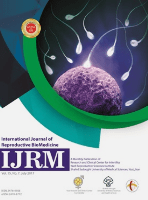
International Journal of Reproductive Biomedicine
Pioneering insights in reproductive biomedicine for all.The International Journal of Reproductive Biomedicine, an esteemed publication by SHAHID SADOUGHI UNIVERSITY OF MEDICAL SCIENCES, serves as a pivotal platform in the fields of obstetrics and gynecology as well as reproductive medicine. Established in 2011 and transitioning to an open access model in 2015, this journal facilitates the dissemination of innovative research and critical findings to a global audience, particularly focusing on advancements in reproductive health and biomedicine. With an impact factor reflective of its commitment to high-quality scientific inquiry, the journal has achieved a notable ranking of Q3 in both its categories for 2023, contributing to its growing influence within the academic community. Researchers and professionals benefit from its broad scope, which encompasses a range of topics essential to reproductive health, thus fostering a rich exchange of knowledge. The journal's accessibility allows students and professionals alike to engage with the latest findings and contribute to ongoing discussions within this vital field of study.
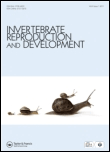
INVERTEBRATE REPRODUCTION & DEVELOPMENT
Unraveling the Mysteries of Invertebrate Biology.INVERTEBRATE REPRODUCTION & DEVELOPMENT, published by Taylor & Francis Ltd, is a pivotal journal in the fields of Animal Science and Zoology, with a significant focus on the reproductive and developmental processes of invertebrates. Established in 1989 and running through 2024, this journal has become an essential resource for researchers, professionals, and students interested in the intricacies of invertebrate biology. With an impressive Q2 ranking in Animal Science and Zoology and a dedicated readership, the journal explores a variety of topics including reproductive mechanisms, developmental stages, and phylogenetic aspects of invertebrates. While currently not open access, the journal provides robust scholarly content that contributes to advancing knowledge in both basic and applied biological sciences. The Scopus rankings further underscore its relevance, particularly in the domains of developmental biology and genetics, making it a noteworthy publication for those engaged in this dynamic field of research.
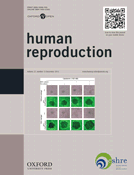
HUMAN REPRODUCTION
Exploring the latest breakthroughs in reproductive health.HUMAN REPRODUCTION is a prestigious academic journal published by Oxford University Press, dedicated to advancing the field of reproductive medicine. With an impressive impact factor highlighting its significance, the journal ranks in the top quartile (Q1) for Obstetrics and Gynecology, Rehabilitation, and Reproductive Medicine, showcasing its crucial role in disseminating high-quality research. Founded in 1986, it has become a key resource for researchers, practitioners, and students interested in cutting-edge developments and innovative practices in human reproduction. Despite not currently offering open access, the journal continues to publish a wealth of peer-reviewed articles that contribute substantially to clinical knowledge and practice. With Scopus rankings placing it among the top journals in its categories, HUMAN REPRODUCTION remains an essential platform for discussion and dissemination of vital findings impacting reproductive health globally.
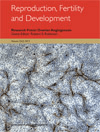
REPRODUCTION FERTILITY AND DEVELOPMENT
Exploring the frontiers of fertility and developmental research.Reproduction, Fertility and Development, published by CSIRO Publishing, is a prestigious journal that has been at the forefront of research in the fields of reproductive science, developmental biology, and related disciplines since its inception in 1989. With an ISSN of 1031-3613 and an E-ISSN of 1448-5990, this journal serves as a vital platform for disseminating innovative findings and methodologies that advance our understanding of reproductive processes and development in a variety of organisms. The journal is indexed in prominent databases, exhibiting a solid standing with a Q3 quartile ranking in both Animal Science and Zoology and Biotechnology, and covering 2023 rankings in multiple related categories. Operating from Australia, Reproduction, Fertility and Development embraces a commitment to enriching scholarly communication and fostering collaborative research efforts. Its focus on high-quality, peer-reviewed articles makes it an essential resource for researchers, professionals, and students seeking to stay abreast of the latest advancements and pivotal discussions in reproductive medicine and developmental biology.
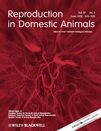
REPRODUCTION IN DOMESTIC ANIMALS
Pioneering Research for Sustainable AgricultureREPRODUCTION IN DOMESTIC ANIMALS is a distinguished peer-reviewed journal published by Wiley that has been at the forefront of advancing knowledge in the field of animal science since its inception in 1966. With an ISSN of 0936-6768 and an E-ISSN of 1439-0531, this journal specializes in the intricate aspects of reproductive biology in domestic species, supporting both scientific research and practical applications in agriculture. Ranked Q2 in Animal Science and Zoology and Q3 in both Biotechnology and Endocrinology, the journal plays a crucial role in addressing contemporary challenges in animal reproduction, contributing significant insights to researchers, professionals, and students alike. Although it does not currently offer open access, its editorial team is committed to publishing high-quality studies that enhance our understanding of reproductive mechanisms and foster advancements in the field. The convergence of data, innovative methodologies, and practical implications in the journal fosters a rich dialogue among scientists and practitioners worldwide, making it an essential resource for anyone invested in animal reproductive health.

THERIOGENOLOGY
Unveiling the complexities of reproductive strategies in animals.THERIOGENOLOGY is a prestigious academic journal published by Elsevier Science Inc, dedicated to the field of veterinary reproduction and animal science. With an impressive impact factor and recognized as a Q1 journal in various categories including Animal Science and Zoology, Equine, Food Animals, and Small Animals, THERIOGENOLOGY has established itself as a vital resource for researchers, practitioners, and students alike. Founded in 1974, the journal covers a broad spectrum of topics related to reproductive physiology, biotechnology, and the health management of food and companion animals. Although it does not currently offer open access, researchers can benefit from its comprehensive articles and reviews that push the boundaries of knowledge in veterinary science. With a significant placement in the Scopus rankings, ranking #1 in multiple veterinary categories, THERIOGENOLOGY serves as an essential platform for advancing the understanding of reproductive strategies and practices, thereby contributing directly to the fields of animal husbandry and veterinary medicine.